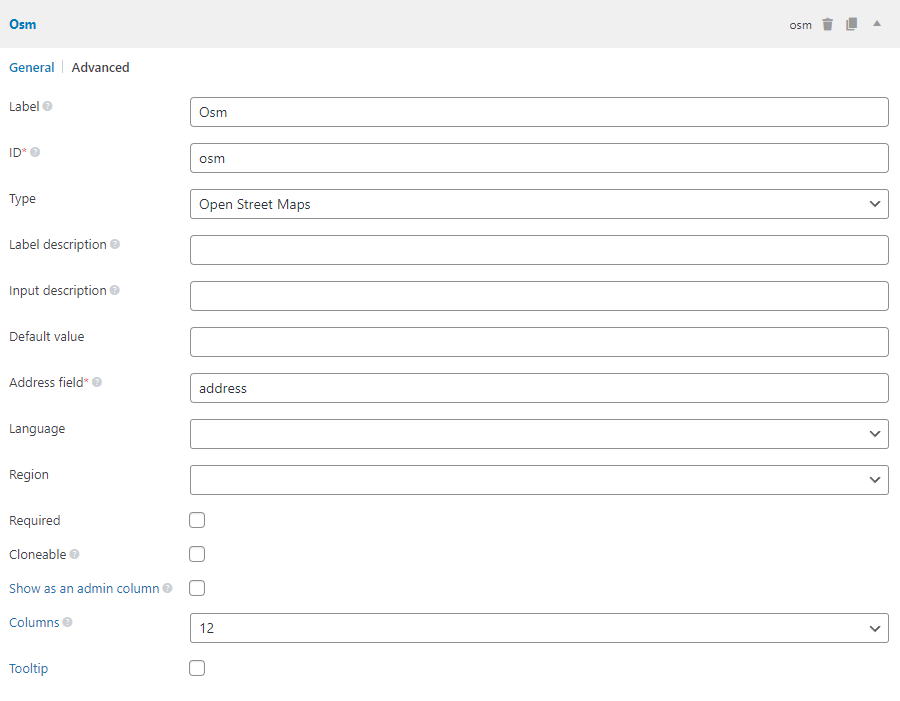Open Street Map
This field creates a Open Street Map where you can select a location. This field is very similar to the Google Map field and provides an alternative solution for displaying maps, since Google requires developers to enter credit card details.
This field supports all features that the Google Maps field has. It comes along with a text field for address input, which has the autocomplete feature. The data for address autocomplete is gotten from Nominatum geocoding service.
You also can pick a location by clicking on the map or dragging and dropping the marker. When you do that, the coordinates are saved in the field value.
This field uses Leaflet library to render the map.
Screenshots


Settings
Besides the common settings, this field has the following specific settings, the keys are for use with code:
| Name | Key | Description |
|---|---|---|
| Default location | std | Default location of the map when loaded. Format '53.346881,-6.258860' (latitude, longitude). If missing, the field will show Dublin, Ireland. |
| Address field | address_field | The ID of the address field. For multiple address fields, enter field IDs separated by commas. Required. |
| Language | language | Language for more accurate auto-complete results. See list of language codes. Optional. |
| Region | region | Limit search results to a specific country (or a list of countries). Accepts ISO 3166-1alpha2 code. Optional. |
You're required to create a text field for entering an address and pass its ID to the map's "Address field".
The address field can be also a list of text input fields' IDs, separated by commas. For example: street,city,state. In that case, there's no autocomplete for address. Instead of that, when you click the Find Address button (below the map), the field will search for the address combined with the values of those fields and set the location for the map.
This is a sample field settings array when creating this field with code:
// Address field.
[
'id' => 'my_address',
'name' => 'Address',
'type' => 'text',
],
// Map field.
[
'id' => 'map',
'name' => 'Location',
'type' => 'osm',
'std' => '-6.233406,-35.049906,15',
'address_field' => 'my_address',
],
Data
This field saves the location in the following format latitude,longitude,zoom.
Template usage
Displaying the map
To display the maps on the frontend, use the rwmb_the_value() function, but we need to add more parameters:
<h2>Maps</h2>
<?php
$args = [
'width' => '640px',
'height' => '480px',
'zoom' => 14,
'marker' => true,
'marker_icon' => 'https://url_to_icon.png',
'marker_title' => 'Click me',
'info_window' => '<h3>Title</h3><p>Content</p>.',
];
rwmb_the_value( 'my_field_id', $args );
?>
| Parameter | Description |
|---|---|
width | Map width, default is 640px. Can be '%' or 'px'. |
height | Map height, default is 480px. Can be '%' or 'px'. |
zoom | Map zoom, default is the value set in admin, and if it's omitted - 14. |
marker | Display marker? true (default) or false. |
marker_icon | URL to the marker icon. Optional. |
marker_title | Marker title when hover. |
info_window | Content for the info window displayed when click the marker. HTML allowed. This content will be passed to JavaScript, so it's better to avoid quotes. |
js_options | Additional map options. Map options are passed into the Leaflet library. See here. |
The code below shows how to use js_options for advanced control how the map is displayed:
$args = [
'width' => '640px',
'height' => '480px',
'js_options' => [
'doubleClickZoom' => false,
],
];
rwmb_the_value( 'my_field_id', $args );
Getting field value
In case you don't want to display the map, but get the location's latitude and longitude, use the code below:
$location = rwmb_get_value( $field_id );
echo $location['latitude'];
echo $location['longitude'];
echo $location['zoom'];
Read more about rwmb_get_value().
Outputting a map in a group
If you have a map inside a group, then the helper functions above don't work. In that case, you can use a helper function in the plugin to show the map.
$args = [
'width' => '640px',
'height' => '480px',
];
$group_values = rwmb_meta( 'group_id' );
// If group is cloneable
foreach ( $group_values as $group_value ) {
echo RWMB_Map_Field::render_map( $group_value['map_id'], $args );
}
The helper function RWMB_Map_Field::render_map accepts 2 parameters:
Name|Description
$location|The location of the map center / marker, in format latitude,longitude[,zoom] (zoom is optional). It's the same format as the map field value.
$args|Additional parameters for the map. The same as for helper function rwmb_the_value above.